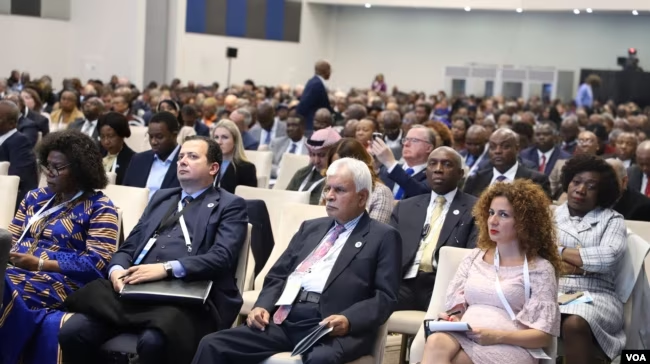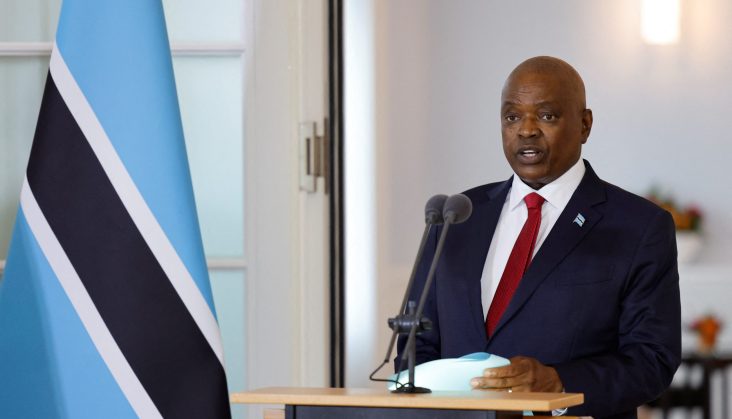
By TZBN Staff and Agencies
Collaboration between Governments and the private sector is key in achieving robust economic growth in countries, a US corporate executive said in Gaborone, Botswana, during the opening ceremony of the just ended US-African Business Summit.
On the other hand, African leaders at the summit called for time extension of the US Africa Growth Opportunities Act (AGOA) which grants some African countries freedom to export products into the US tax free. The AGOA is set to expire in less than 24 months from the time of writing this post but VOA has quoted US Government officials as saying AGOA will be extended.
Addressing the over 1300 delegates at the just ended Summit, Chairman of the Board of Directors for the US Corporate Council on Africa (CCA) Dr. Jeffrey L. Sturchio–the summit organizers– underscored the importance of collaboration between Governments and private sector, describing partnerships as “vital” for achieving great things in a country.
He said by collaborating, “we can achieve really robust economic growth,” explaining however that in the end, it is the Government role that is critical in creating conditions conducive to that growth which is then brought by the private sector.
The Corporate Council on Africa organized this Summit as a follow-up to the December 2022 US-African Leaders Summit in Washington DC. The four-day Summit started on July 11. Dr. Sturchio underscored the importance of collaboration between Governments and the private sector in a brief welcome address during the opening session.
The 1,300 delegates in attendance represented Governments, the corporate world, and small businesses, according to officials. Delegates included Presidents from Eswatini, Lesotho, Mozambique, Niger and Zimbabwe.

Through this follow-up summit, organizers had hoped to strengthen further United States economic cooperation with Africa according to officials who say the U.S.-Africa Business Summit is the Corporate Council on Africa’s premier annual event designed to bring together African heads of state, senior U.S. and African government officials, and top CEO’s and senior business executives from the U.S. and Africa representing sectors that are critical to the continent’s development.
African leaders urged renewal of the long-standing Africa Growth Opportunities Act (AGOA), which gives some African countries preferential or even tax-free access to the US for their exports. The agreement is due to expire in 2025, and African delegates at the summit want the deal renewed VOA reported.
Botswana President Mokgweetsi Masisi, addressing delegates gathered in Gaborone for the summit, led the pleas to Washington to renew the arrangement. Since it was put into place in 2000, AGOA has been credited with creating more than 46,000 jobs in Africa and bolstering exports to the U.S.

“It is also our earnest hope that in consonance with the letter and spirit of the U.S.-Africa Leaders Summit, the Biden administration will renew the African Growth and Opportunity Act initiative, which expires in 2025,” he said. “The AGOA renewal now, with expanded mandates, will give a strong signal and confidence to the markets and serve as a catalyst for Africa’s industrialization and inclusion into the global value chains.”
Florie Liser, chief executive and president of the Corporate Council on Africa, which organizes the U.S.-Africa Business Summit, said there is a need to examine AGOA in light of an agreement known as the African Continental Free Trade Area.
“A lot has changed” in Africa and beyond since AGOA came into being, she said. “The advent of the African Continental Free Trade Area is fostering much closer economic and commercial integration on the continent, which will spur the creation of regional and continental value chains and increase value added across key sectors. In many ways, the question is how best we can support this development.”
The Atlantic Council Africa Center produced a report titled The Future of U.S.-Africa Trade and Investment, which analyzes the future of the AGOA. The report was issued Wednesday at the U.S.-Africa Business Summit.
Frannie Leautier, a senior fellow at the Atlantic Council and the report’s lead author, said, “On extending or renewing AGOA, the idea is to realize the potential of AGOA for long-term development through greater certainty, planning and skilled up support for capacity development and investment flow.
The first [recommendation] is straightforward: just extend it. The second one is to provide longer-term certainty about AGOA eligibility, because investors are waiting for that. Nobody is going to invest now if they think AGOA is not going to be extended.”
Not all African countries benefit from AGOA. Some, like Ethiopia, Mali and Guinea, were barred because of coups and human rights violations. South Africa’s eligibility is being reviewed over the alleged sale of arms to Russia.
Meanwhile, Scott Nathan, chief executive of the U.S. International Development Finance Corporation, who is leading the U.S. government delegation at the summit, pledged continued support for Africa.
“[The] United States is focused on what we will do with African nations and people, and not for African nations and people,” he said. “We work to deepen and understand our partnership, amplify African voices and support the empowerment of Africans.”



